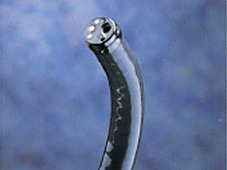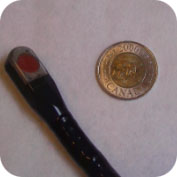Anyway I was watching Discovery Health (flipping past really... I rarely WATCH it) and there was a cardiologist talking about a test they "rarely" do in the ER. A TEE. A TEE stands for TransEsophageal Echocardiogram. Break it down -- basically a picture of the heart using soundwaves with the probe being in the esophagus (your feeding tube) Then they have the patient talking about it and him being scared and they show a picture of a medical instrument and you're supposed to assume it's a TEE.
BUT IT'S NOT!!!
They show what is probably a gastroscope -- a camera used to see into your stomach. And I can guess why they used that instead. It's kinda like a TEE, almost the same shape, put down the same tube, but more melodramatic because it's got a light at the end of it and they pointed the light into the camera and it faded out to the next scene and ooooh.... aaaaahhhh....
Anyway NOT the same
 |  |
| Tip of gastroscope probe | Tip of TEE probe |
| Images used without permission fromFujinon Singapore and St. Michaels Hospital respectively | |
3 comments:
Just found your page; good luck on the boards.
Question: How do you pass a TEE probe in surgery (i.e., when the patient can't swallow and probably has an ET tube)?
Just wondering (I can't sleep either.. ugh)
-Dan
Good question. The patient can't swallow but he's asleep and relaxed enough that you can pass the probe (more or less blindly) down the esophagus. Believe it or not, they use these probes in awake patients who are only sedated and numbed up a bit in the throat. As for the ET tube, it's coming out the mouth, but it's going into the trachea so it's mostly not in the way.
I frequently pass probes under GA but have found that the less blindly one does it the better, preferably before the patient is draped for surgery. Adequate jaw thrust can be difficult, as can suitable postural access, particular in cardiac surgery.
On one occasion when I have passed a probe under such conditions, the mucosa of the oropharynx was damaged. Under most circumstances this would have been undesirable yet not particularly problematic however when the patient was heparinised, pre CPB, what had seemed fairly insignificant became a very worrying issue!
Jim.
Post a Comment